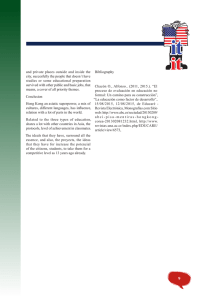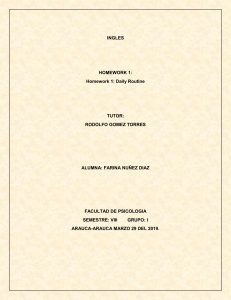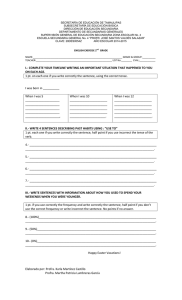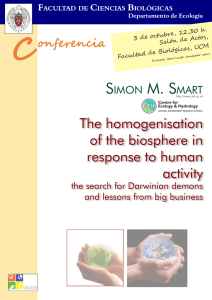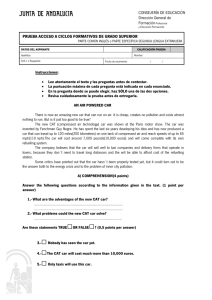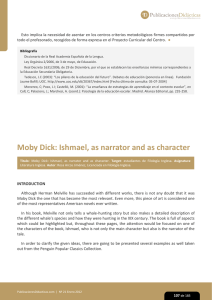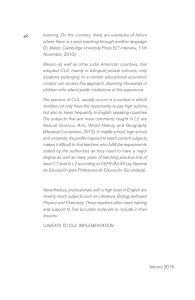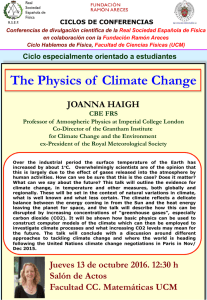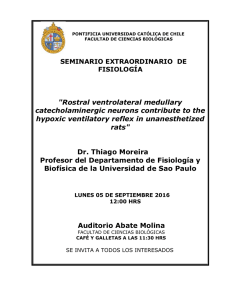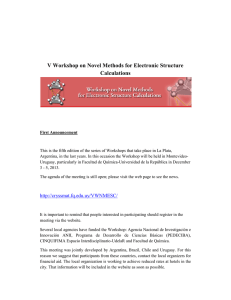01. SIFUENTES LOERA BRIGGITTE- Early Literature Delaware Traditional
Anuncio
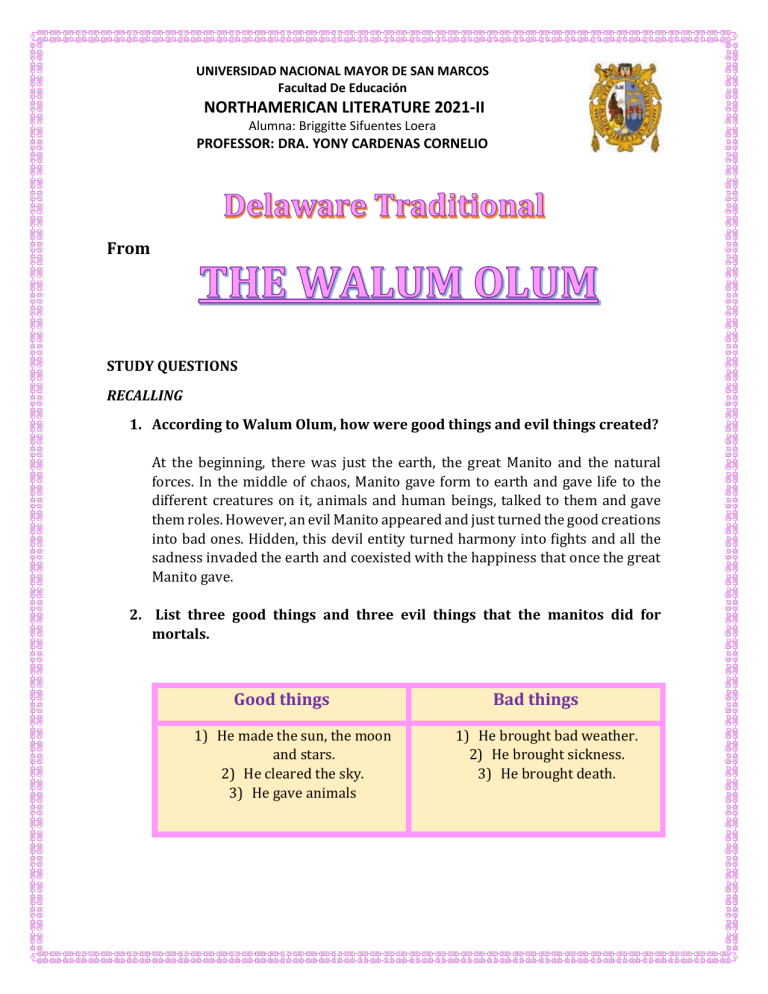
UNIVERSIDAD NACIONAL MAYOR DE SAN MARCOS Facultad De Educación NORTHAMERICAN LITERATURE 2021-II Alumna: Briggitte Sifuentes Loera PROFESSOR: DRA. YONY CARDENAS CORNELIO From STUDY QUESTIONS RECALLING 1. According to Walum Olum, how were good things and evil things created? At the beginning, there was just the earth, the great Manito and the natural forces. In the middle of chaos, Manito gave form to earth and gave life to the different creatures on it, animals and human beings, talked to them and gave them roles. However, an evil Manito appeared and just turned the good creations into bad ones. Hidden, this devil entity turned harmony into fights and all the sadness invaded the earth and coexisted with the happiness that once the great Manito gave. 2. List three good things and three evil things that the manitos did for mortals. Good things 1) He made the sun, the moon and stars. 2) He cleared the sky. 3) He gave animals Bad things 1) He brought bad weather. 2) He brought sickness. 3) He brought death. UNIVERSIDAD NACIONAL MAYOR DE SAN MARCOS Facultad De Educación NORTHAMERICAN LITERATURE 2021-II Alumna: Briggitte Sifuentes Loera PROFESSOR: DRA. YONY CARDENAS CORNELIO INTERPRETING 3. What kind of relationship is depicted between the manitos, or spiritual forces, and mortals? The relationship between the manitos and mortals was a father-son relationship because the manitos gave the mortals all the things they needed to survive, such as food or animals. The manitos also gave the people the freedom to do what they wanted to do , something that is really important in any kind of relationship. 4. Identify two pictographs in which there is a clear translate meaning. Then find two abstract pictographs in which the relationship between picture and the meaning is not obvious. TWO PICTOGRAPHS WHICH THERE IS A CLEAR TRANSLATE MEANING He gave the fish, he gave the turtles, he gave the beast, he gave the birds. But very secretly an evil being, a mighty magician, came on earth. TWO PICTOGRAPHS WHICH THE RELATIONSHIP BETWEEN PICTURE AND THE MEANING IS NOT OBVIOUS UNIVERSIDAD NACIONAL MAYOR DE SAN MARCOS Facultad De Educación NORTHAMERICAN LITERATURE 2021-II Alumna: Briggitte Sifuentes Loera PROFESSOR: DRA. YONY CARDENAS CORNELIO All had cheerful knowledge, all had leisure, all thought in gladness. And with him brought badness, quarrelling, unhappiness, Navaho Traditional Listen! Rain Approaches! Truly in the east ………… (1) The white bean…………. (2) And the great corn plant…… (3) Are tied with the white lightning…. (4) Listen! rain approaches!......(5) The voice of the bluebird is heard…. (6) Truly in the east……… (7) The white bean ……… (8) And the great squash………. (9) Are tied with the rainbow…….. (10) UNIVERSIDAD NACIONAL MAYOR DE SAN MARCOS Facultad De Educación NORTHAMERICAN LITERATURE 2021-II Alumna: Briggitte Sifuentes Loera PROFESSOR: DRA. YONY CARDENAS CORNELIO Listen! rain approaches!.......(11) The voice of the bluebird is heard…. (12) RECALLING 1. Which lines in the first stanza are repeated in the second stanza? Which lines are varied? Lines repeated: 1-7/ 2-8/ 5-11/ 6-12 Lines varied: 3, 4 , 9, 10 2. What two specific elements of a rainstorm does the song mention in lines 4 and 10? Line 4: White lightning Line 10: Rainbow INTERPRETING 3. What does the verb repeated in lines 4 and 10 imply about the relationship of things in nature? In what way does the other repetition in the poem contribute to this idea? - It tries to let us understand that nature works as a unit, as whole, not just individual parts. In the poem in different lines some words are repeated but others are changed to emphasize the idea of a unit no matter if we change ‘’corn plant’’ with ‘’squash’’ or other things from nature. 4. What stages of a storm does the variation in lines 4 and 10 represent? What broader characteristics of nature do these lines suggest? While line 4 depicts a rainfall in full swing, line 10 shows that the rainfall is almost over and it is possible to catch sight of a rainbow. These two lines also refer to nature’s unpredictability and contradiction. UNIVERSIDAD NACIONAL MAYOR DE SAN MARCOS Facultad De Educación NORTHAMERICAN LITERATURE 2021-II Alumna: Briggitte Sifuentes Loera PROFESSOR: DRA. YONY CARDENAS CORNELIO EXTENDING 5. What purposes, besides bring rain, do you think someone might have for singing a ritual song? Music is perhaps especially useful when working with a group. Singing or chanting together can really help get everyone together, their energy focused in the same place. In rituals which use the same music regularly (such as the same opening chant) the repetition makes it easier and easier to drop into a ritual mindset. Hear (and sing) the first few words, and it’s common to feel your body and mind shifting. Ojibwa Traditional RECALLING 1. With what phrases is the beloved described in the first two lines? To what does the speaker compare his singing heart in stanza 2? ➔ The beloved is described as: ➢ Flower of the forest ➢ Sky treading bird of the prairie. ➢ Wonderful fawn-eyed one. ➔ The speaker compares his singing heart to a branch that dances to the rhythm of the wind 2. According to stanza 3, what happens in nature when the beloved frowns? When the beloved smiles? According to stanza 3, when the beloved frowns its heart grows dark and a shining river the shadows of clouds darken. When the beloved smiles, comes the sun and makes to look like gold. Grace Villegas UNIVERSIDAD NACIONAL MAYOR DE SAN MARCOS Facultad De Educación NORTHAMERICAN LITERATURE 2021-II Alumna: Briggitte Sifuentes Loera PROFESSOR: DRA. YONY CARDENAS CORNELIO INTERPRETING 3. What is the one general thing that speaker and the beloved are compared to throughout the poem? What seems to be its importance in the life of the Ojibwa? In general, it is compared to nature's connection with their natural environment. The important thing in the life of the Ojibwa is that their lives or traditions connect them with their environment that surrounds them, in other words nature. 4. Which images of the beloved do you find most moving or expressive, and why? “Sky treading bird of the prairie” and “Blood of my beating heart”. The first one mentions a majestic flying animal who lives in a landscape; this is very expressive due to the fact it involves two main elements of nature. The second one is very moving; it conceives the beloved as the motor of his life since without blood there won’t be any beat in his heart. EXTENDING 5. Remember that this song is a translation from an Indian language. How is it English- language love poems that you have read? In what ways, if any, is it different? By and large, English - language love poems encompass the author's love interest in a certain vein either describing particular features of the poetry subject or using nature elements to represent places and situations that reflect the intentions of the poet when referring to his love, a case in point is the poem of Annabel Lee from Edgar Allan Poe. All the same, the poem Calling One's own depicts in a graphic manner what the author feels when he comes into contact with his muse using visual symbolisms from the natural world. For instance, symbolisms such as the comparison between the red streams of my veins run toward you, that highlights the fact that the poet's blood runs through a temporary path and towards her muse whenever she is around, which under any other circumstances would not occur. UNIVERSIDAD NACIONAL MAYOR DE SAN MARCOS Facultad De Educación NORTHAMERICAN LITERATURE 2021-II Alumna: Briggitte Sifuentes Loera PROFESSOR: DRA. YONY CARDENAS CORNELIO
